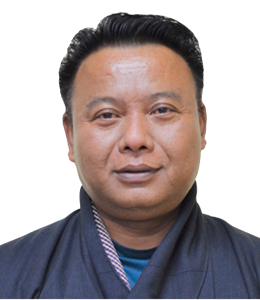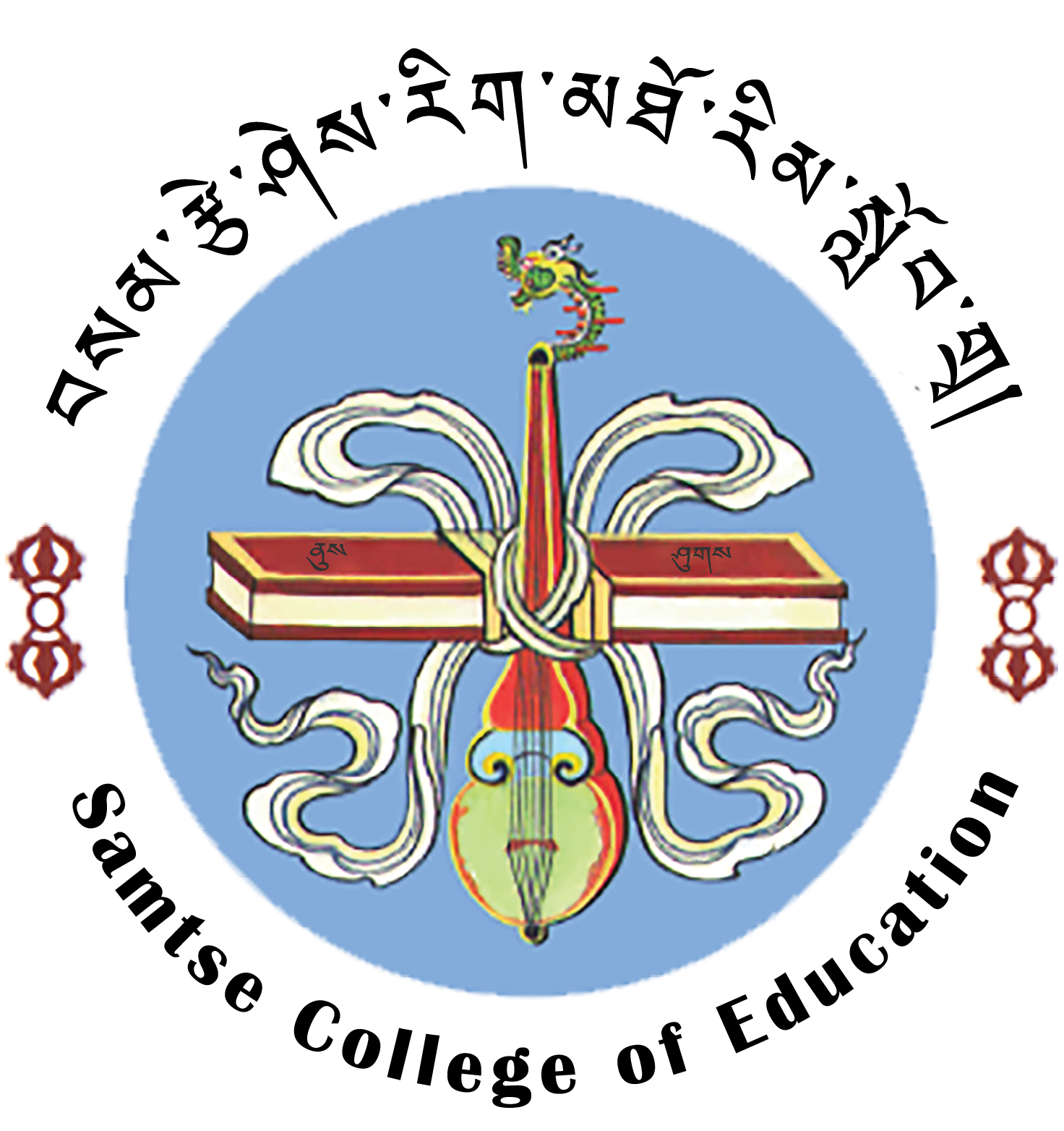Dr. Kinzang Dorji, Lecturer
 Philosophy of teaching and learning:
Philosophy of teaching and learning:
Provide a brief description of your personal philosophy of teaching and learning and any other details that can market you as an academic. The whole writing here could be done in not more than TEN sentences.
I believe that all learners are born as unique individuals and possess high-versatility traits that may include resilience, vision, competence, adaptability and self-reflection in their own ways that they can bring to their own education. To this connection, teaching learning environment or a classroom should be a safe and caring community where learners are free to speak their mind and blossom. I also believe that todays’ students must have access to 21st century teaching-learning approaches that would mean let their curiosity direct their learning, put their hands on-practice, create opportunity to practice skills, and make them access to educational technologies and digital gadgets. Here, teacher’s role is to play as a guide or facilitator.
Academic/Educational Qualification:
- Doctor of Philosophy (PhD) in Bioassessment of streams health, Queensland University of Technology, Brisbane, Australia
- Master of Scientific Studies (MSc.) in Fire Ecology, University of New England, NSW, Australia
- Post Graduate Certificate in Education (PGCE), National Institute of Education, Samtse, Bhutan
- Sc. (Hons) in Botany, North Bengal University, India.
Professional experience:
- Programme Leader for PGDE (full-time & part-time) programmes (2016 to till date)
- Lecturer, Department of Science Education, Samtse College of Education (2005 to till date)
- Coordinator for Teaching Practice, Samtse College of Education, RUB (2012 – 2014)
- Coordinator for the Centre for University Learning and Teaching(CULT), Samtse College of Education, RUB (2008 – 2012)
- Subject Head (Biology Dept.), Samtse College of Education, RUB (2007)
- Secondary science teacher (1998 to 2004)
Current responsibilities:
My 15 years of university-level teaching experiences in the College of Education include teaching at both undergraduate and post-graduate level programmes, and involves multi-disciplinary subject teaching areas such as teaching of Skills and Strategies; Environmental Education; Functional Information Technology; Educational Action Research; and other core modules in biological sciences. These educational experiences added values in my professional growth such as in periodical programme review process, designing and developing a new programme and programme specific modules for any new programme in the college.
HoD, Department of STEM Education
Membership in External Bodies:
- CAC
- PgDE committee
- PBEM
Publications:
Books/Manuscripts
CL4STEM-Bhutan. (2023). Strengthening Secondary School Teacher Capacities for Higher Order Thinking with Inclusion and Equity. Connected Learning for STEM, Samtse College of Education, Royal University of Bhutan, Bhutan.
Dorji, K., Dorji, R., Rinchen, S., Giri, N. & Gurung, G. (2020). The school immersion and teaching practice (SITP) handbook (1st ed.). Samtse College of Education, Royal University of Bhutan. ISBN 978-99936-25-05-6
Dorji, K., Rinchen, S. and Zam, T. (2019). A guide to field identification plants of southern Bhutan. LAMBERT Academic Publishing, EU. ISBN: 978-3-330-04010-6
Dorji, K. (2019). A guide to bioassessment of stream health: A research based in Bhutan. LAMBERT Academic Publishing, EU. ISBN: 978-613-9-46456-2
Dorji, K. (2018). The effects of fire-related germination cues: Time-since-fire and habitats on the germinable soil-borne seed banks. LAMBERT Academic Publishing, EU. ISBN: 987-613-7-74390-4
Maxwell, T. W., Reid, J. M., Gyamtso, D. C., & Dorji, K. (2008). Changing the culture of learning and teaching at the Royal University of Bhutan: Report on the establishment of the centre for university learning and teaching (CULT). Publisher: Samtse College of Education, Royal University of Bhutan.
Thesis
Dorji, K. (2016). Utility of an existing biotic score method in assessing the stream health in Bhutan.. [Doctoral thesis, Queensland University of Technology], Brisbane, Australia. https://eprints.qut.edu.au/97993/1/Kinzang_Dorji_Thesis.pdf
Dorji, K. (2005). The effects of fire-related germination cues, time-since-fire and habitats on the germinable soil-borne seed banks at the Torrington State Conservation Area (NSW). Master Thesis. Publisher: University of New England, Australia.
Book chapters
Dorji, K. & Giri, N. (2022). Bhutanese partnerships between initial teacher training colleges and educational stakeholders. In: Otrel-Cass, K., Laing, K.J.C., Wolf, J. (eds) Partnerships in education transdisciplinary perspectives in educational research, vol 5, 45-57. Springer, Cham. https://doi.org/10.1007/978-3-030-98453-3_3
Journal articles
Dorji, K. & Zam, T. (2024). Overcoming student misconceptions in cell division: Impact of audio-visual tools on conceptual clarity. International Journal of Multidisciplinary Innovative Research 4(4), 41-51. https://ijmir.org/2024-v4n4/
Dorji, K. Tashi, Thapa, K. (2024). Human-wildlife conflict and land use changes: A case study of elephant-human conflict in Samtse District, Bhutan. International Journal of Multidisciplinary Innovative Research 4(4), 61-69. https://ijmir.org/2024-v4n4/
Dorji, K. Rai, R. & Kinley. (2024). Enhancing connected learning for STEM (CL4STEM) adoption: Insights into Bhutanese In-Service and Pre-Service Teachers’ Perceptions and Implementation Challenges. International Journal of Multidisciplinary Innovative Research 4(4), 51-60. https://ijmir.org/2024-v4n4/
Kinley, Rawat, T., Dorji, K., Mongar, B.B. & Tamang, R.S. (2024). The Impact of Open Educational Resources Based Professional Development on the Bhutanese Secondary Biology In-service and Pre-Service Teachers. International Journal of Multidisciplinary Research 6(1), 1-13. DOI: https://doi.org/10.36948/ijfmr.2024.v06i01.9173
Subba, B.S. Dorji, K. (2024). Effectiveness of Computer Assisted Instruction on Secondary School Students’ Achievement in Biology: A Case Study in Samtse Dzongkhag. Asian Journal of Education and Social Studies 50(10), 329-343. DOI: https://doi.org/10.9734/ajess/2024/v50i101623
Galley, L.R & Dorji, K. (2023). An assessment of climate change impact on the livelihoods of farmers at Deling village in southern Bhutan. International Journal of Agriculture and Environmental Research 9(4), 586-611. DOI: https://doi.org/10.51193/IJAER.2023.9408
Dorji, K., & Dorji, K. (2023). Self-Directed Learning Approach in Teaching Biology to Grade Nine Students. Journal of Education, Society and Behavioural Science, 36(10), 56-71. DOI: 10.9734/JESBS/2023/v36i101267
Gyaltshen, N. & Dorji, K. (2022). Learning Station Approach for Teaching
Genetics in Grade ten in Tendu Central School,
Bhutan. International Journal of Applied Chemical and Biological Sciences 3(3), 21-31. https://identifier.visnav.in/1.0001/ijacbs-22d-24006/
Dorji, S, Dorji, K. (2022). Flipped classroom in teaching biology assessing students’ academic achievement in Tang central school, Bumthang district. Interdisciplinary Journal of Applied and Basics Subjects, 2(2), 1-8. https://identifier.visnav.in/1.0002/ijabs-22a-10002/
Tharchen, T., Dorji, S., & Dorji, K. (2022) Factors hindering conduct of biology laboratory work in classes IX and X schools under Trongsa district in Bhutan. International Journal of Applied Chemical and Biological Sciences 3(2), 58-69. https://identifier.visnav.in/1.0001/ijacbs-22c-07006/
Dorji, K., Giri, N., Penjor, T. Rinchen, S. (2021). Factors influencing the performance of students in mathematics subject in the bhutanese school education system. Interdisciplinary Journal of Applied and Basic Subjects 1(6), 35-51
Wangda, K., Dorji, K. & Kinley (2021). Teachers and students perception on the impact of Kagan cooperative learning structures at higher secondary school. ASEAN Journal of Open and Distance Learning, 12(2), 100-116.
Gurung, A., ., K., Dorji, K., & Nepal, A. (2020). Parental involvement in students’ academic performance: A study based at Pelrithang middle secondary school, Gelephu, Bhutan. Journal of Community Development Research (Humanities And Social Sciences), 14(1), 71-80. doi:10.14456/jcdr-hs.2021.7
Seden, K, Wangmo, S., Dorji, K. & Wangmo (2020). Impact of classroom wellbeing on student learning: Bhutanese students’ perceptions. Journal of the International Society for Teacher Education, 24(2), 31-44.
Seden, K., Willert, S., Dorji, S., & Dorji, K. (2020). Impact of mother’s education on the academic achievement of their children in three lower and secondary schools of Samtse dzongkhag: An inquiry. Bhutan Journal of Research and Development, 9(1), 1-18.
Clarke, P. J. & Dorji, K. (2008). Are trade-offs in plant resprouting manifested in community seed banks? Ecology, 89(7), 1850-1858. doi:10.1890/07-0704.1
Dorji, K. (2008). Effects of fire and fire related germination cues such as heat; smoke and ash on soil-borne seed banks. Rigter (3), 43-51.
Current research engagement:
- CL4STEM Project
- EUFSTIAT Project
- GESI Project
Awards: NA
Research interest:
Email address:
